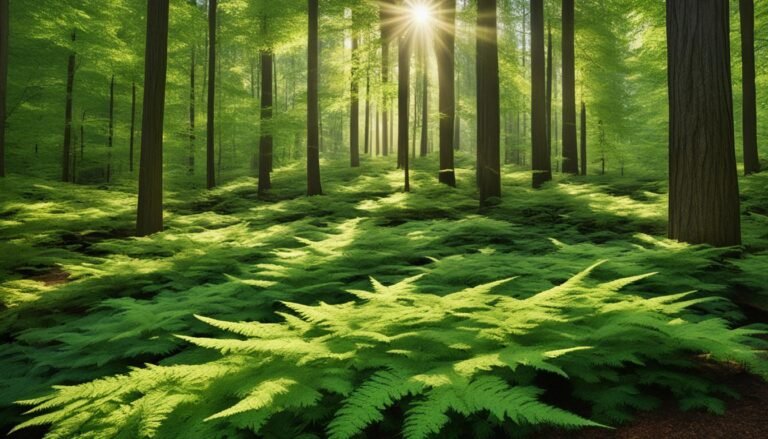When I first started gardening, I had no idea that the type of soil could make such a difference in plant growth. I had always assumed that as long as I watered my plants regularly, they would thrive. But I soon learned that the pH level of the soil plays a crucial role in determining which plants can thrive and which ones struggle.
One summer, I decided to transform a barren patch of land in my backyard into a lush garden. However, there was a problem – the soil in that area was alkaline, with a pH level above 7. I knew I had to find trees that could tolerate alkaline soil if I wanted my garden to succeed.
I started researching and talking to local gardening experts to find out which trees would be the best fit for alkaline soil. Armed with their advice and my newfound knowledge, I set out to create a garden that would thrive despite the challenging soil conditions.
Key Takeaways:
- Alkaline soil can pose challenges for gardening, but there are trees that thrive in this type of soil.
- Understanding the pH level of your soil is essential for choosing the right plants.
- Factors like natural causes and man-made causes can contribute to alkaline soil.
- Alkaline soil has its advantages and disadvantages, and it’s important to consider them before planting.
- Choosing trees, shrubs, edibles, and flowers that are tolerant of alkaline soil can help you create a beautiful garden.
Understanding Alkaline Soil and pH Levels
Alkaline soil, also known as high pH soil, is characterized by a pH level above 7. To determine the pH level of your soil, a pH tester kit can be used. This simple test provides valuable information regarding the suitability of different plants for alkaline soil conditions.
Alkaline soil can have both advantages and disadvantages when it comes to gardening. While some plants thrive in high pH environments, others may struggle to access essential nutrients. Consequently, it may be necessary to make amendments to optimize conditions for specific plants.
“Understanding the pH level of your soil is essential for determining the suitability of different plants.”
Factors Influencing Alkaline Soil
Alkaline soil can be influenced by both natural and man-made factors, which can affect its pH level and overall composition. It’s important to understand these factors when planning your planting scheme for alkaline soil.
Natural Causes of Alkaline Soil
One of the natural causes of alkaline soil is the weathering of minerals, such as calcium carbonate and calcium bicarbonate. Over time, these minerals break down and release alkaline substances into the soil, raising its pH level. This process can occur naturally in areas with limestone or chalk deposits.
Man-Made Causes of Alkaline Soil
In addition to natural causes, man-made factors can also contribute to alkaline soil. Pollution from coal-fires can release sulfur dioxide into the environment, which can react with water to form sulfuric acid. When this acidic rainwater leaches into the soil, it can neutralize the acidity and increase the pH level, resulting in alkaline soil.
Another man-made factor is the use of sodium salts in cleaning products. When these salts find their way into the soil, they can displace other essential nutrients and increase the alkalinity of the soil. Similarly, wet cooling towers can release alkaline substances into the air, which can settle on the surrounding soil and contribute to alkalinity.
Softened water, often used to reduce the hardness of water, can also contribute to alkaline soil. This is because the process of water softening involves the replacement of calcium and magnesium ions with sodium ions. When this water is used for irrigation, it can gradually increase the alkalinity of the soil.
In summary, alkaline soil can be influenced by natural causes, such as the weathering of minerals, as well as man-made factors like pollution and the use of sodium salts and softened water. By taking these factors into consideration, you can better understand and manage alkaline soil in your garden or landscape.
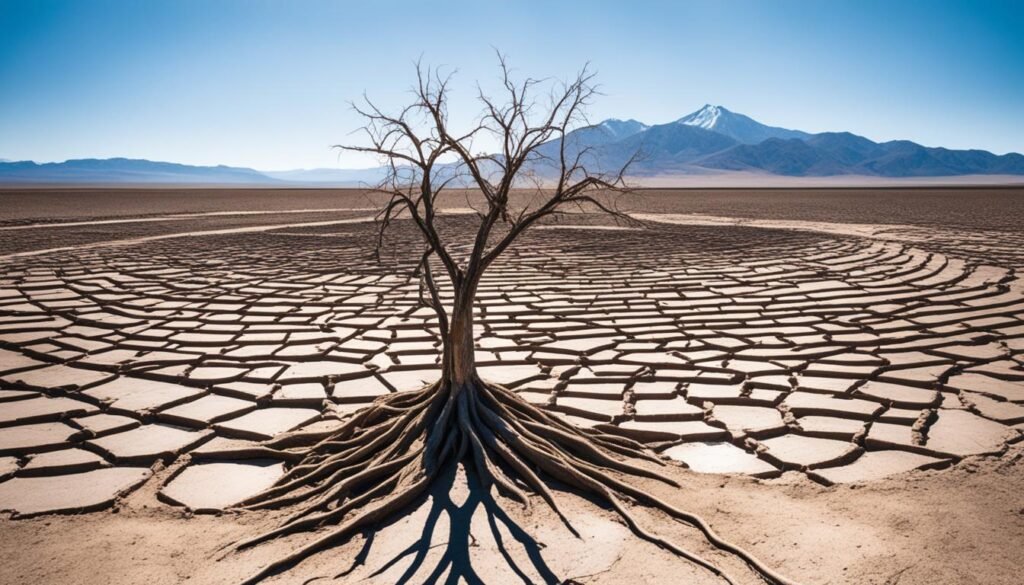
Pros and Cons of Alkaline Soil
Alkaline soil, like any other soil type, has its own set of advantages and disadvantages. Understanding these pros and cons is crucial for making informed decisions when it comes to gardening in alkaline soil.
Advantages of Alkaline Soil
- Plant Compatibility: One of the advantages of alkaline soil is that it provides a favorable environment for certain plants that prefer alkaline conditions. These plants, such as lilacs, lavender, and alkaline-loving grasses, can thrive and flourish in alkaline soil.
- Reduced Soil-Borne Diseases: Alkaline soil is known to be less prone to soil-borne diseases compared to acidic or neutral soils. This can be advantageous for maintaining the health and vitality of your plants, reducing the risk of plant diseases caused by pathogens in the soil.
Disadvantages of Alkaline Soil
- Challenges for Acid-Loving Plants: One of the main disadvantages of alkaline soil is its unsuitability for ericaceous plants, also known as acid-loving plants. These plants, including azaleas, rhododendrons, and blueberries, require acidic soil conditions and may struggle to thrive in alkaline environments.
- Limited Nutrient Availability: Alkaline soil can limit the availability of essential nutrients to plants. Certain micronutrients, such as iron, manganese, and zinc, may become less accessible to plants in alkaline soil. This can result in nutrient deficiencies and hinder the overall growth and development of plants.
Understanding the pros and cons of alkaline soil allows gardeners to select suitable plants and take appropriate measures to address any challenges. With proper care and adjustments, gardening in alkaline soil can still yield successful and vibrant landscapes.
Now that we have examined the advantages and disadvantages of alkaline soil, let’s move on to the specific trees that thrive in alkaline soil conditions.
Trees for Alkaline Soil
In alkaline soil conditions, it can be challenging to find trees that thrive. However, there are several tree species that are known to tolerate or even excel in alkaline soil. These trees can add beauty, shade, and structure to your garden while adapting to the pH levels of the soil.
Here are some trees that are well-suited for alkaline soil:
- Blackthorn
- Cotoneaster frigida
- Field maple
- Hawthorn
- Holm oak
- Montezuma pine
- Spindle
- Sorbus alnifolia
- Strawberry tree
- Yew
While many traditional fruit trees prefer slightly acidic soil, there are a couple of exceptions that can adapt to alkaline conditions. Fig trees and cherry trees are more tolerant of alkaline soil and can thrive in such environments.
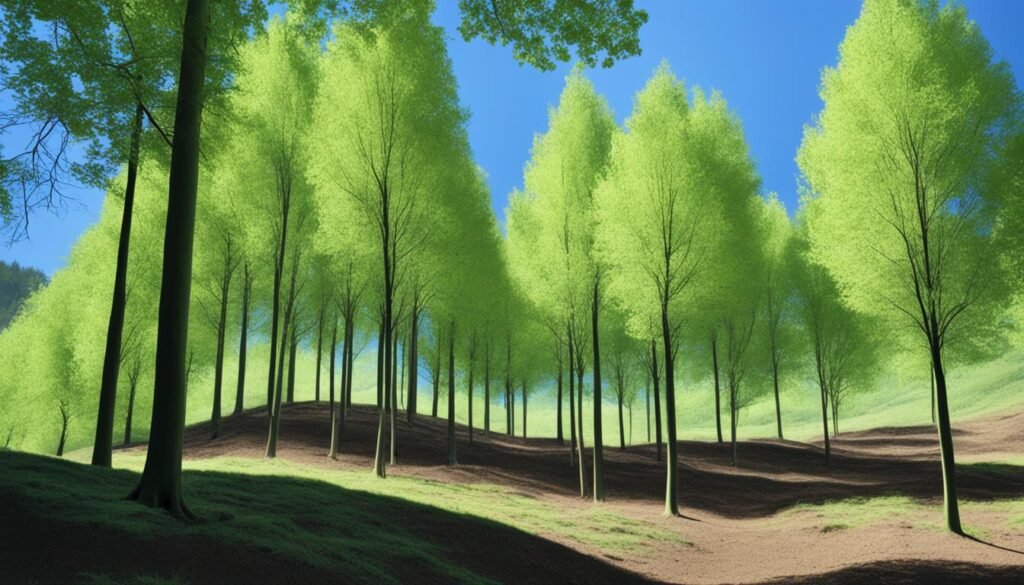
| Tree Species | Preferred Soil Type | Height | Hardiness Zone |
|---|---|---|---|
| Blackthorn | Alkaline soil | 16-20 feet | 4-7 |
| Cotoneaster frigida | Alkaline soil | 3-4 feet | 4-6 |
| Field maple | Alkaline soil | 40-60 feet | 5-8 |
| Hawthorn | Alkaline soil | 20-30 feet | 4-8 |
| Holm oak | Alkaline soil | 40-70 feet | 7-11 |
| Montezuma pine | Alkaline soil | 40-60 feet | 5-8 |
| Spindle | Alkaline soil | 15-20 feet | 5-7 |
| Sorbus alnifolia | Alkaline soil | 10-15 feet | 5-7 |
| Strawberry tree | Alkaline soil | 25-30 feet | 7-10 |
| Yew | Alkaline soil | 20-50 feet | 4-9 |
Shrubs for Alkaline Soil
Shrubs can be a wonderful addition to a garden with alkaline soil. Not only do they provide structure and form, but they also add beauty with their colorful blooms and foliage. If you’re looking for shrubs that can thrive in alkaline soil conditions, here are some great choices for you to consider:
- Buddleia: Also known as butterfly bush, Buddleia attracts a variety of pollinators with its fragrant flowers. It’s a hardy shrub that can tolerate alkaline soil and adds a splash of vibrant colors to your garden.
- Deutzia ‘Pride of Rochester’: This compact shrub features beautiful clusters of white-pink flowers that bloom in spring. It thrives in alkaline soil and adds a touch of elegance to any garden.
- Forsythia: Known for its bright yellow flowers that herald the arrival of spring, forsythia is a tough shrub that can withstand alkaline soil conditions.
- Hydrangea: Hydrangeas are beloved for their large, showy blooms that come in a variety of colors. They can adapt well to alkaline soil, but the flower color may vary based on the soil pH.
- Lilac: Lilacs are renowned for their fragrant flowers and are well-suited to alkaline soil. They come in a range of hues, from pale lavender to deep purple, and can add a touch of nostalgia to your garden.
- Osmanthus: This evergreen shrub produces small, highly fragrant flowers in spring. It thrives in alkaline soil and can provide year-round interest with its glossy foliage.
- Philadephus: Commonly known as mock orange, Philadephus features gorgeous white flowers with a lovely citrus-like fragrance. It’s a hardy shrub that can adapt well to alkaline soil conditions.
- Santolina Chamaecyparissus: Also known as lavender cotton, Santolina is a low-maintenance shrub that thrives in alkaline soil. It has silvery-gray foliage and produces small yellow flowers that can add a unique touch to your garden.
- Viburnum Opulus: Viburnum Opulus, or guelder rose, is a versatile shrub that can tolerate alkaline soil. It boasts beautiful clusters of white flowers and bright red berries, making it a visually striking addition to any garden.
- Weigela: Weigela is a deciduous shrub that offers eye-catching trumpet-shaped flowers in a variety of colors. It’s adaptable to alkaline soil and can add a pop of color to your outdoor space.
These shrubs are not only visually appealing but are also well-suited to alkaline soil conditions. They can thrive and provide beauty in gardens that face the challenges of high pH levels. So, don’t be deterred by alkaline soil – embrace it and create a stunning landscape with these shrubs that are up to the task.
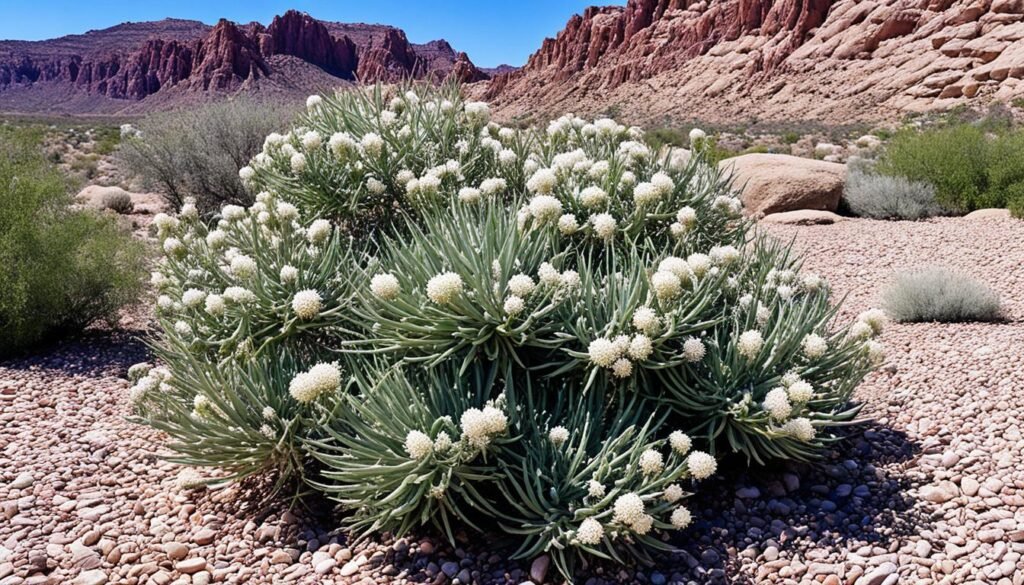
Edibles for Alkaline Soil
While alkaline soil may pose challenges for growing certain fruits and vegetables, there are edibles that can thrive in slightly alkaline conditions. Understanding which edibles are compatible with alkaline soil can help you plan your garden accordingly.
Fruits for Alkaline Soil
Although many fruit trees prefer slightly acidic soil, there are some varieties that can tolerate alkaline conditions. Two such examples are fig trees and cherry trees.
**Here is the information for the table. You should fill the table with accurate and informative data that aligns with the topic of this section.**
Vegetables for Alkaline Soil
When it comes to vegetables, certain types are well-suited to alkaline soil. Members of the brassica family, including cabbages, kale, and broccoli, are known to tolerate alkaline conditions. Additionally, legumes such as peas and pole beans can also thrive in slightly alkaline soil.
**Here is the information for the table. You should fill the table with accurate and informative data that aligns with the topic of this section.**
In addition to brassicas and legumes, herbs like rosemary and thyme can also be grown successfully in alkaline soil. These aromatic herbs not only add flavor to your dishes but also provide year-round greenery to your garden.
When it comes to perennial edibles, asparagus is a great choice for alkaline soil. It’s a hardy vegetable that can withstand the alkaline conditions and provide you with delicious spears every spring. Strawberries are another excellent option for alkaline soil, as they are known to perform well in slightly alkaline pH levels.
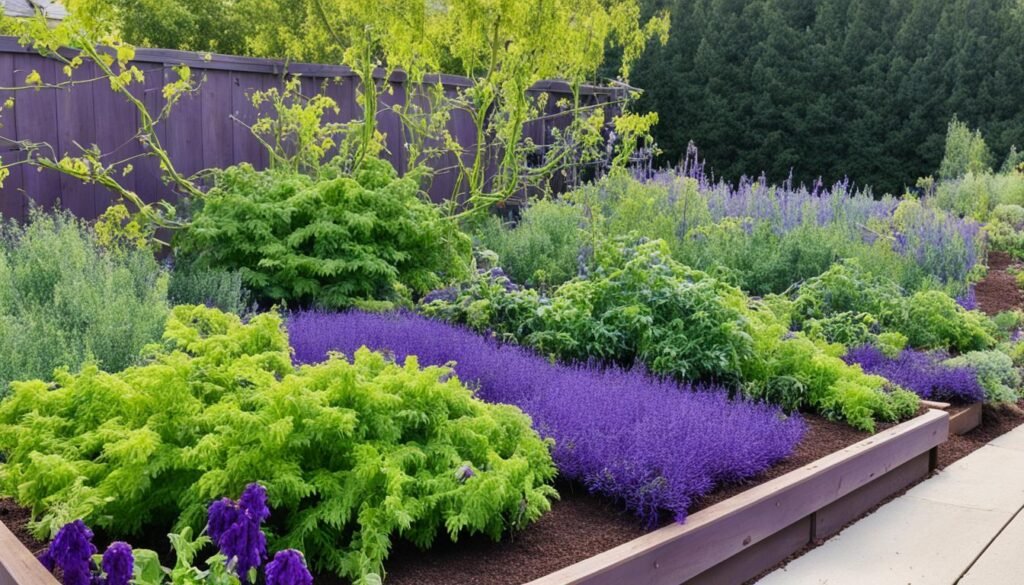
Flowers for Alkaline Soil
Flowers are not only visually appealing, but they also play a crucial role in the overall aesthetic of a garden. When it comes to alkaline soil, there are several flower options that can thrive and add color and beauty to your outdoor space. These flowers are tolerant of alkaline soil conditions and can create a stunning display in your garden.
“Flowers are like the paintbrushes that add vibrant colors to the canvas of your garden, even in alkaline soil conditions.”
Here are some suitable flowers for alkaline soil:
- Anchusa
- Borage
- California poppies
- Lavender
- Lily of the valley
- Phacelia
- Polemoniums
- Trifolium
- Viper’s bugloss
- Wild marjoram
These flowers not only add splashes of color to your garden, but they also attract beneficial insects, such as bees and butterflies, which play a crucial role in pollination. With their adaptability to alkaline soil, these flowers can thrive and truly enhance the beauty of your outdoor space.
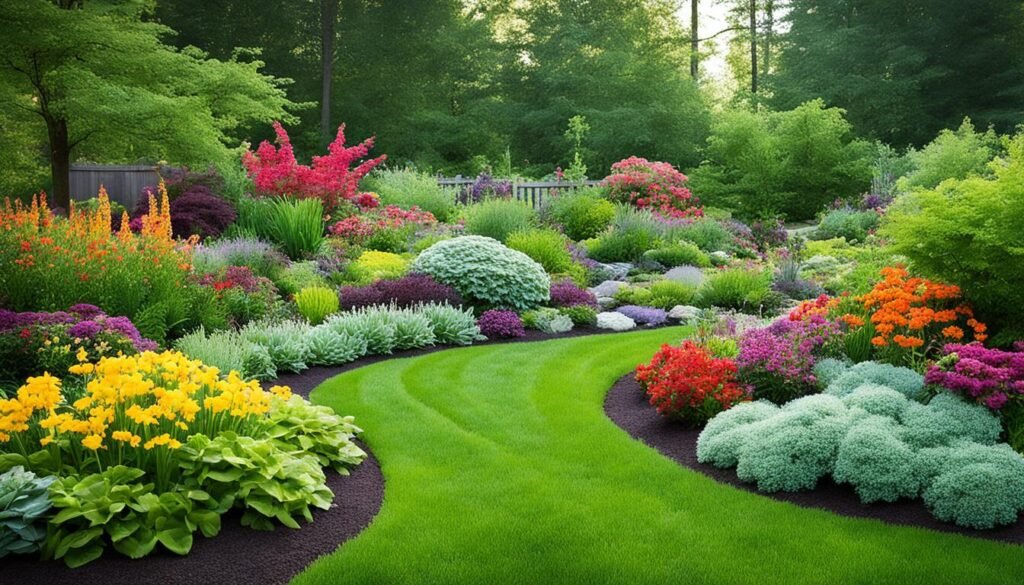
| Flower | Description |
|---|---|
| Anchusa | Anchusa produces vibrant blue flowers and has a long flowering period. It is a hardy plant that can tolerate alkaline soil. |
| Borage | Borage flowers are known for their bright blue color and their ability to attract pollinators like bees. They are well-suited to alkaline soil conditions. |
| California poppies | California poppies come in a range of colors, including vibrant orange and yellow. They add a cheerful touch to any alkaline soil garden. |
| Lavender | Lavender is not only prized for its fragrant flowers but also its ability to thrive in well-drained alkaline soil. It adds a touch of elegance and relaxation to any garden. |
| Lily of the valley | Lily of the valley is known for its delicate bell-shaped flowers and sweet fragrance. It can tolerate alkaline soil, adding a charming touch to shady areas. |
| Phacelia | Phacelia features beautiful clusters of purple flowers and is a magnet for bees and other pollinators. It can thrive in alkaline soil conditions. |
| Polemoniums | Polemoniums, also known as Jacob’s ladder, produce clusters of beautiful blue or purple flowers. They can tolerate alkaline soil and add a touch of elegance to any garden. |
| Trifolium | Trifolium, commonly known as clover, comes in various species and adds a pop of color to alkaline soil gardens. It is also beneficial for fixing nitrogen in the soil. |
| Viper’s bugloss | Viper’s bugloss is a hardy plant that produces vibrant blue or purple flowers. It thrives in alkaline soil and attracts pollinators. |
| Wild marjoram | Wild marjoram, also known as oregano, features clusters of tiny pink or purple flowers. It is a hardy herb that can thrive in alkaline soil. |
Conclusion
Gardening in alkaline soil can be challenging, but with the right approach, it is possible to create a thriving landscape. By selecting plants that are well-suited to alkaline soil conditions, you can ensure their optimal growth and health. Throughout this article, I have provided a variety of options for trees, shrubs, edibles, and flowers that can thrive in alkaline soil.
When embarking on your alkaline soil gardening journey, it is important to test your soil pH regularly. This will help you understand the exact needs of your soil and make any necessary amendments to create a more favorable environment for your plants. Additionally, sourcing plants from nurseries that specialize in alkaline soil gardening is essential to ensure you have the right species and varieties.
With proper planning and care, you can transform your alkaline soil into a beautiful garden that flourishes. Remember to provide your plants with adequate water, sunlight, and nutrients. Consider incorporating organic matter into the soil to improve its fertility and structure. By using these techniques and the knowledge gained from this article, you can successfully landscape with alkaline soil and create a stunning outdoor space.
